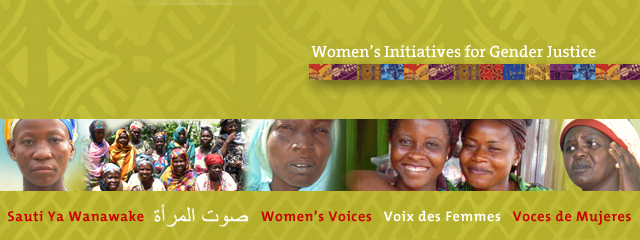|
|
||
|
||
 |
||
December 2013 |
||||
Welcome to the |
||||
|
||||

The Women's Initiatives for Gender Justice is an international women's human rights organisation that advocates for gender justice through the International Criminal Court (ICC) and through domestic mechanisms, including peace negotiations and justice processes. We work with women most affected by the conflict situations under investigation by the ICC. The Women's Initiatives for Gender Justice works in Uganda, the Democratic Republic of the Congo, Sudan, the Central African Republic, Kenya, Libya and Kyrgyzstan. Offices 
|
Dear Friends,Welcome to the December 2013 issue of Women's Voices, a regular eLetter from the Women's Initiatives for Gender Justice. In Women's Voices, we provide updates and analysis on political developments, the pursuit of justice and accountability, the participation of women in peace talks and reconciliation efforts from the perspective of women's rights activists within armed conflict situations, specifically those countries under investigation by the International Criminal Court (ICC) including Uganda, the Democratic Republic of the Congo (DRC), Darfur, the Central African Republic (CAR), Kenya, Libya, Côte d'Ivoire and Mali. In addition to Women's Voices, we also produce a regular legal eLetter, Legal Eye on the ICC, with summaries and gender analysis of judicial decisions and other legal developments at the International Criminal Court (ICC), and discussion of legal issues arising from victims' participation before the Court, particularly as these issues relate to the prosecution of gender-based crimes in each of the Situations under investigation by the ICC. More information about the work of the Women's Initiatives for Gender Justice and previous issues of Women's Voices and Legal Eye on the ICC can be found on our website www.iccwomen.org. Women’s Initiatives hosts reception during the Assembly of States PartiesOn 25 November 2013, the Women’s Initiatives for Gender Justice and the Swedish Ministry for Foreign Affairs held a reception in honour of the International Day for the Elimination of Violence against Women. The event was held at the World Forum Convention Center as part of the Twelfth Session of the Assembly of State Parties (ASP) of the ICC, which took place from 20-28 November 2013 in The Hague. The reception was attended by 180 States Parties Delegates, Court officials and members of civil society participating in the ASP. ICC Prosecutor Fatou Bensouda gave a keynote address with speeches also by the Swedish Ambassador Håkan Emsgård and Women’s Initiatives Executive Director Brigid Inder. ■ Read Prosecutor’s Keynote Speech ■ Read Ambassador Emsgård’s Speech ■ Read Brigid Inder’s Speech The International Day for the Elimination of Violence against WomenRead the full statement available in English and French by the Women’s Initiatives for Gender Justice and partners from Uganda, the Democratic Republic of Congo, Libya and Sudan. The ICC Trust Fund for Victims releases External Evaluation ReportIn 2013, the ICC Trust Fund for Victims (TFV) engaged the International Center for Research on Women (ICRW) to carry out an independent evaluation of the TFV’s programming in Northern Uganda and the Democratic Republic of Congo. The report released at the ICC Assembly of States Parties meeting in November identifies key areas of success and also provides evidence-based recommendations for TFV’s next phase. The report indicates that the TFV and its partners have reached more than 110,000 victims through three types of assistance programmes: physical and psychological rehabilitation and material support. Among the most significant changes indicated by victims in the study were the ability to live a ‘normal life’ again, plan for the future and resume work and school. The evaluators found that the TFV has successfully promoted peaceful cohabitation, strengthened the institutional capacity of partners for gender mainstreaming and contributed to the lifting of "shame and blame" of victims of sexual and gender based violence (SGBV). The report also highlights some risks and challenges including the high cost and expertise requirements related to the provision of physical rehabilitation, the risk of on-going traumatisation related to psychological rehabilitation and the scope and sustainability of material support initiatives. A detailed set of recommendations is also included in the report. Read the full report here. |
|
|
|
|
||||||||||||||||||||||||||
